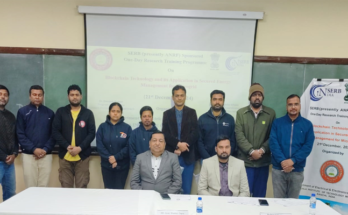 # Corruption now becomes the profession; risk-taking appetite is increasing among the people which are destroying our society, said CJ Ajay Kumar Tripathi.
# Corruption now becomes the profession; risk-taking appetite is increasing among the people which are destroying our society, said CJ Ajay Kumar Tripathi.
by Ashis Sinha:
Chief Justice of Chhattisgarh High Court Ajay Kumar Tripathi believes that too much consumerism is giving birth to various kinds of crime, compelling people to live the life beyond their needs.
Tripathi, who had been sworn as the Chief Justice of Chattisgarh High Court on July 7 this year, happens to be “son of the soil”, born and brought up in Bokaro. He has been here during Puja vacation.
Justice Tripathi said that people’s rising thirst for consumerism has given birth to corruption. “Failed consumers will lie, cheat and steal to gain the trappings of success so that they can be regarded as normal,” he pointed out.
“Corruption now becomes the profession; risk-taking appetite is increasing among the people which is destroying our society,” he said, adding “It needs to be rooted out immediately.”
“During early days it was different, no one got mugged, perhaps because they did not have anything worth taking. But now in the present generation, people become calculating rather than law-abiding in their overwhelming desire to be normal and for that, they take a wrong path due to their rampant egoism of consumerism, where enough is never enough,” said the CJ.
“And precisely because of its competitive nature, consumer-driven crime cannot be switched off through tougher laws,” he added. “Today, it is the need to change the thinking of common people.”
“We all have to build a strong society with a sympathetic thinking and people will have to develop a tendency to comply with the law and not to violate it.”
Alumni of St. Xavier School, Bokaro, he said. “Judicial system can also play a vital role but it needs quality people (in judiciaries) and quick delivery of judgment.”
He was elevated as an Additional Judge of Patna High Court on October 9, 2006 and took oath as a Permanent Judge of the High Court on November 21, 2007.
Admitting the utmost need to strengthen the legal services in the tribal areas, especially in the bordering areas of Jharkhand and Chhattisgarh i.e. Ambikapur, Latehar, Palamu and others, the CJ said, “I have joined recently in Chhattisgarh and yet to visit those areas, but will take a necessary step after going through the official process.”
“Access to legal services continues to be a challenge for the tribal population especially residing in remote areas due to geographical, resource and infrastructure constraints,” he added.
The problem has been compounded by the failure of mainstream legal-aid services, particularly for the marginalized sections. Marginalised communities, especially rural and tribal population; senior citizens; persons with low income; persons with disabilities; victims of drug abuse, human trafficking; prison inmates- the rightful recipients of legal aid- are unable to avail it.
“To be able to deliver appropriate legal services to the rural and tribal communities, we need an alternative delivery system with a different model of legal service providers,” he said.
Prior to his elevation, Justice Tripathi had held the office of Standing Counsel for the Union of India and the Income Tax Department. He appeared as a special counsel for the CBI and the Auditor and Comptroller General of India. He also represented many Public Sector Undertakings. He has appeared in many important cases of the day which made headlines at the state and national level.
He is presently a member of the General and Academic Council of the University. Justice Tripathi is also a member of General Council of National Law School Bangaluru.
He was in the Board of Directors of the Bihar Judicial Academy and Chairman of Bihar State Legal Service Authority when tele-law services were launched in the state of Bihar, which happened to be the 2nd State to do so in the country.




